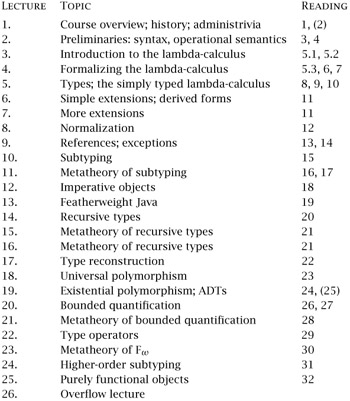Course Outlines
|
| < Free Open Study > |
|
An intermediate or advanced graduate course should be able to cover most of the book in a semester. Figure P-2 gives a sample syllabus from an upper-level course for doctoral students at the University of Pennsylvania (two 90-minute lectures a week, assuming minimal prior preparation in programming language theory but moving quickly).

Figure P-2: Sample Syllabus for an Advanced Graduate Course
For an undergraduate or an introductory graduate course, there are a number of possible paths through the material. A course on type systems in programming would concentrate on the chapters that introduce various typing features and illustrate their uses and omit most of the metatheory and implementation chapters. Alternatively, a course on basic theory and implementation of type systems would progress through all the early chapters, probably skipping Chapter 12 (and perhaps 18 and 21) and sacrificing the more advanced material toward the end of the book. Shorter courses can also be constructed by selecting particular chapters of interest using the dependency diagram in Figure P-1.
The book is also suitable as the main text for a more general graduate course in theory of programming languages. Such a course might spend half to two-thirds of a semester working through the better part of the book and devote the rest to, say, a unit on the theory of concurrency based on Milner's pi-calculus book (1999), an introduction to Hoare Logic and axiomatic semantics (e.g. Winskel, 1993), or a survey of advanced language features such as continuations or module systems.
In a course where term projects play a major role, it may be desirable to postpone some of the theoretical material (e.g., normalization, and perhaps some of the chapters on metatheory) so that a broad range of examples can be covered before students choose project topics.
|
| < Free Open Study > |
|
EAN: 2147483647
Pages: 262